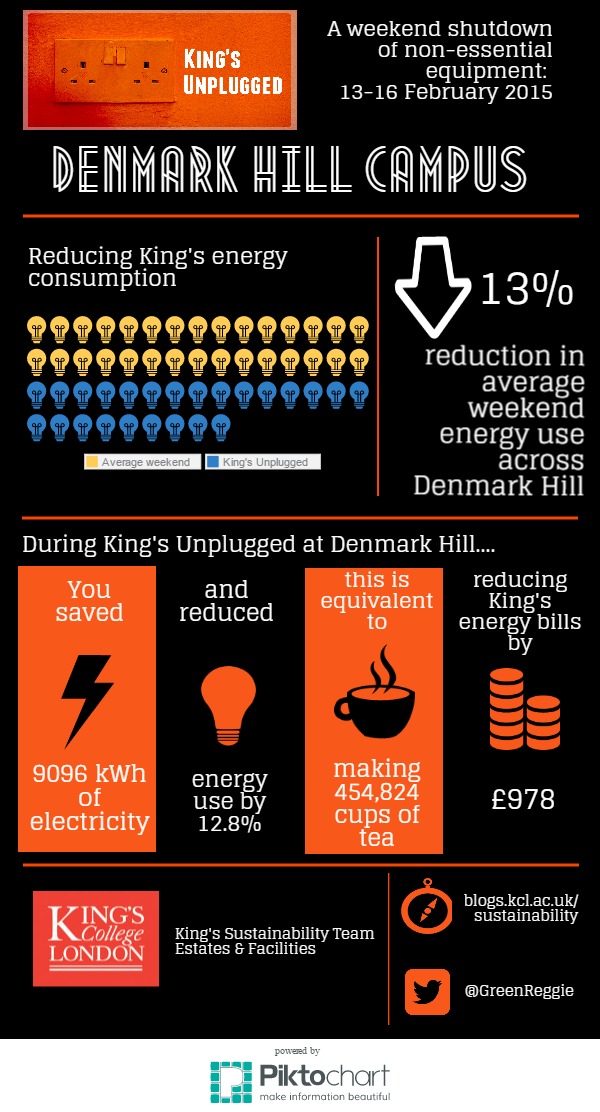Last Tuesday night we had our second sustainability forum which focused on Green space and well-being. We were joined by some wonderful speakers; Kate Sheldon from Trees for Cities, Gavin Atkins from the Ecominds project and Elle, Emily and Tobias from King’s own Urban Garden Project.
Held at Denmark Hill campus, the idea of the forum was to show that there is a benefit to everyone to spend time in green spaces, and how this can be a form of therapy, from helping with depression to relieving exam stress for students.
Our first speaker was Kate talking about Trees for Cities, a charity that started out as Trees for London but now reaches across 15 other UK cities and multiple international. Each year they plant around 50,000-100,000 urban trees with the help of volunteers including members of the local community, schools, corporate groups and many more.
Kate described charity as a ‘natural health service’ giving people the opportunity to improve their health through planting trees. She described how there is vast evidence around the value of high-quality green space for physical and mental health as well as an improvement of the surrounding environment. Involving local communities in the project also makes the community more motivated to look after the trees and take an interest in their local area.
This video shows more about the Horticulture training base located next to Denmark Hill at Ruskin Park. Over 350 hard-to-teach individual have been trained at this site over the last 12 years.
Another project that Trees for Cities are working on is edible playgrounds which aims to combat childhood obesity and hunger. It aims to improve the knowledge of healthy eating among the school children and gives them the tools to make better diet and lifestyle choices.
She ended her talk by mentioning how King’s and Trees for Cities could collaborate, including links between public health commissioners and clinical commissioning groups. If you are interested in anything Kate and Trees for Cities has to offer you can contact her here or visit their website.
The next speaker was Gavin from Ecominds who spoke about ecotherapy – an intervention that improves mental and physical health by supporting people to be active outdoors. Currently 57 locally based Mind charities provide some form of ecotherapy, with 130 Ecominds project setup in 2009. This programmes includes activities such as care farming, green exercise, creative arts and much more. Gavin explained how each project was unique and focused around the individual needs of those in need of the therapy.
One key characetrics within some of the projects is the idea that participants are actively shaping nature, rather than passively experiencing it. It is also key that natural environments can also take you ‘away from stressors’ which can help those that are currently experiencing mental health issues and those thought to be on the verge of developing them.
The Ecominds projects have shown positive outcomes on how the programme can help individuals. 7 out of 10 people experienced significant increase in wellbeing with more than 3 in 5 perceiving a positive impact on their overall health. This is a huge achievement and shows the potential of ecotherapy as a form of treatment. The case studies which Gavin also shared showed how findings like these in practice have saved the NHS/state up to £12,400 a year per person introduced in the schemes.
The major challenge now facing project such as Ecominds (apart from funding) is the perception that there needs to be hard evidence on the benefits of the schemes. GPs often do not realise that these treatments are operating in their area and only 52% of GPs considered ecotherapy suitable for treating anxiety and depression.
The Ecominds project has now come to an end (due to funding) but Mind still continue to run numerous projects. Three publications have been realised with research into ecotherapy. To find out more about these or how to get involved in the project contact Gavin or visit the website.
Finally we had Elle, Emily and Tobias from the Urban Garden project from King’s speak about the work they are doing with regards to having working gardens on campus. Excitingly they now have a confirmed site at Guy’s Campus and one in process at Maugham Library. The hope is that the gardens will start to be developed in the next few months.
The plan is for there to be a mix of seasonal and all year plants, as well as having a few edible plants which can be taken home by the volunteers that grow them.
The project aims to provide stress relief for staff and students as well as teaching them useful gardening skills. The project with also to bright up the campus and make the area a more enjoyable place for students that sit outside in the Quad at Guys or outside the library.
Urban gardens plans to link with Trees for Cities to help in the design and planning stages of the project, with the idea of using upcycled furniture as part of the garden.
Overall this was a great event, giving us a good overview of why green spaces and active involvement with them is just as important for well-being as it is for the environment.


 King’s Food venues will be offering a Fairtrade Rocky Road or Granola bar for ½ price with any Fairtrade hot drink purchased during Fairtrade Fortnight. They are also holding two Fairtrade tasting sessions on Tuesday 24th February at Guy’s Campus and Tuesday 3rd March at Strand Campus.
King’s Food venues will be offering a Fairtrade Rocky Road or Granola bar for ½ price with any Fairtrade hot drink purchased during Fairtrade Fortnight. They are also holding two Fairtrade tasting sessions on Tuesday 24th February at Guy’s Campus and Tuesday 3rd March at Strand Campus.


